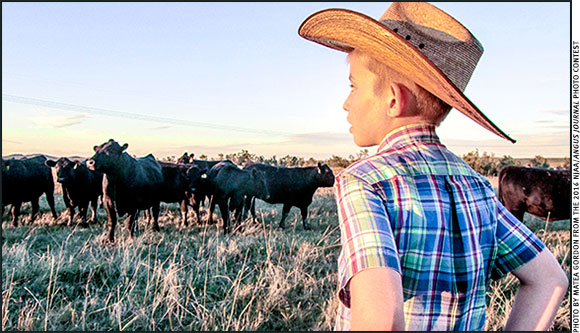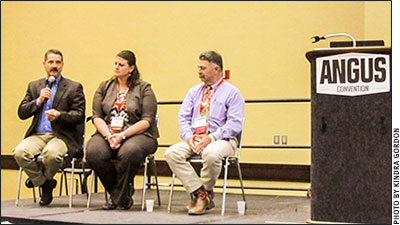

Keep It In the Family
Angus University panel discusses ranch transition.
Three Angus families shared their stories of working through generational succession on their operations during a panel discussion hosted as part of the Angus University Workshops on Nov. 6. Kansas Angus breeders Mark Gardiner of Gardiner Angus Ranch, Ashland, and Paige Pratt of Johnson Farms LLC, Dwight, were joined by Donnell Brown of R.A. Brown Ranch based in Texas. The discussion was moderated by Barbara Dartt with The Family Business Consulting Group.

From left, Donnell Brown of R.A. Brown Ranch, Texas, joined Kansas Angus breeders Paige Pratt, Johnson Farms LLC, and Mark Gardiner, Gardiner Angus Ranch, in a panel discussion on ranch transitions.
All three individuals stressed the need for communication among family members — starting early and continuing.
Brown, who is the youngest of four siblings, credited his parents for fostering family communication around the dinner table 40 years ago while the children were still young. Four years ago, his parents had the foresight to initiate the transfer of the ranch to the four children and their families, allowing the children to decide how to divide the land.
“My parents said, ‘We’ve lived our dreams and want to watch our kids pursue theirs,’ ” Brown explained.
Pratt, who grew up in Kansas, married and moved to Virginia, where she and her husband were establishing a seedstock herd. Her dad called and invited them to return to Kansas and join him and her brother and his family in the operation. They accepted, and now the trio of families is working together. Pratt emphasized that monthly management meetings are critical to keep the communication flowing between her dad, husband and brother, who each have different personalities and management styles. Quarterly meetings involve the men and their spouses.
Gardiner also credited his parents for initiating family meetings while he was 11 or 12 years old.
“I hardly understood the concept of death, let alone estate planning at that age, but eventually you began to understand,” he shared. Gardiner and his siblings were given opportunities to buy land and invest in the family business. He noted that some of his siblings made different choices, but they still value each sibling’s opinions.
Gardiner emphasized, “There’s no right way or wrong way. The ultimate question is how are you going to work it out?”
He added, “Growing the business is a work right, not a birthright. It’s OK to talk about things and not always agree, but everyone comes to the table. The worst thing you can do is not talk about things. We’re not going to be here forever.”
 Gardiner also shared a story of his dad, Henry, planting a tree shelterbelt and assigning the job of weeding and watering those trees to Mark with his brother Greg when they were young. While Gardiner said he wasn’t fond of the task, years later as a parent he came to recognize the value of getting the kids to work together.
Gardiner also shared a story of his dad, Henry, planting a tree shelterbelt and assigning the job of weeding and watering those trees to Mark with his brother Greg when they were young. While Gardiner said he wasn’t fond of the task, years later as a parent he came to recognize the value of getting the kids to work together.
“Ultimately, I planted a tree shelterbelt for my kids to weed and water,” he said, adding, “Whatever chore you do together, those become family meetings.”
“If we can teach our kids how to work, earn, save, invest and work together, those are the key points to be successful,” Brown said, reflecting on watching his own children and nieces and nephews grow to adulthood. “We extend to them they have an opportunity to return to the family operation, but not the obligation.”
In her closing comments, Pratt emphasized to the senior generation in the industry, “If you want a hired hand to work, that’s fine, but if you want a partner for the next generation, that requires a different conversation and approach.”
To the younger generation she said, “If the older generation won’t put down a plan, you should leave. That is unfair and unequitable, and you should walk away.”
She also noted that it is important to show appreciation to all family members. “No matter what roles they have, making people feel valued and a part of the team is very important.”
Brown summarized that communication and leadership are essential to address the transition process and closed by saying, “It’s important to make plans to keep the ranch in the family and the family in the ranch.”
The panel was one of the Angus University Workshops sponsored by Merck Animal Health Nov. 6 at the 2016 Angus Convention. For comprehensive coverage of the Angus Convention, including speaker summaries, links to the full presentations, photos, videos and more, visit www.angus.media/news/Angus-Convention.

Editor’s Note: Field Editor Kindra Gordon is a freelance writer and cattlewoman from Whitewood, S.D.






